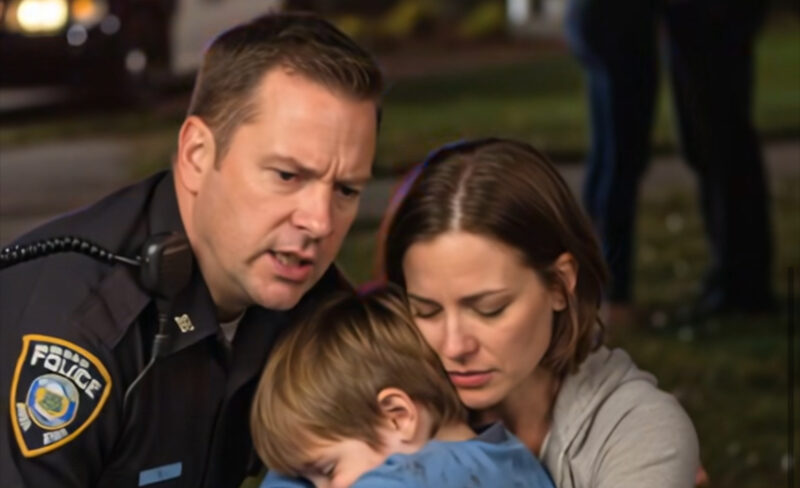The clock read 11:47 p.m. when the phone rang, halting my heartbeat for what felt like three endless seconds upon hearing the chilling words, “Highway Patrol.” The voice on the other end belonged to Officer Rodriguez. “Mrs. Hayworth, this is Officer Rodriguez. Your son, Quinton, is here at the station. He’s safe now, but we need you to come immediately.”
Indeed, the word ‘safe’ should have brought calm to the chaotic pounding in my chest. However, my mind was overwhelmed, replaying the image of Quinton sound asleep at home, under his father’s care while I worked my shift at Mercy General. My hands trembled so fiercely that grasping the car keys became a struggle. That fifteen-minute drive to the police station stretched into the longest journey of my life, consumed by dreadful thoughts of every possible nightmare. How did my eight-year-old end up with the police? Where was Dale? Why was my husband not answering his phone?
As I burst through the station doors, my eyes immediately found him: my little boy, swallowed up by a plastic chair that only made him look smaller. His favorite dinosaur pajamas were torn at the knee and stained with dirt. Tears streamed down his face, but upon seeing me, he threw himself into my arms with such force that it nearly knocked me backward.
“Mommy!” he sobbed, his tiny form shaking. “I tried to find you. I walked and walked, but the cars were so fast, and I got scared.”
“Sweetheart, what happened?” I whispered into his hair, my heart breaking. “Why were you outside? Where’s your dad?”
At that moment, Officer Rodriguez, a woman bearing the sharp, discerning gaze developed from years on the force, stepped forward. She wore the look of someone piecing together a puzzle with missing fragments. “A trucker spotted your son walking along Highway 95 around 11:15 p.m.,” she explained, fixing her eyes on me. “He told us Quinton was trying to get to the hospital to find you.”
“That’s three miles from our home,” I murmured, hugging Quinton tighter. “Honey, why were you trying to find me? What happened at home?”
What Quinton shared next sent the ground beneath me tilting. He pulled back enough to meet my gaze, his brown eyes swimming with a sorrow no child should endure. “Dad locked me outside,” he said in a small, broken voice. “He told me to play in the backyard, then shut the door. I kept calling, but he wouldn’t let me back in.”
“No, sweetie, that doesn’t make sense. Dad would never do that.”
“No, Mom,” his voice grew firmer, more insistent. “He pushed me outside. I heard the door click. And Aunt Karen was there.”
The mention of Aunt Karen hit me like a stone to the gut. Why was my husband’s sister at our house so late?
“She came after you left for work,” Quinton continued, words dropping like heavy stones. “Dad said they had ‘important grown-up things’ to do and I needed to play outside. But then it got dark and cold. They were in your bedroom, making strange noises. I could hear them through the window.”
The concern on Officer Rodriguez’s face shifted from professional worry to grave seriousness. She signaled another officer to take Quinton for some hot cocoa while she spoke to me privately. “Mrs. Hayworth, we have been trying to reach your husband for over an hour. Your neighbor, Mrs. Chen, called us after noticing our patrol car. She has security footage that you might need to see.”
Security footage of what? Even as I questioned, the pieces started falling into place—the late nights Dale claimed he was working, the way Karen constantly needed his help, the faint and unfamiliar scent of perfume on our sheets that I’d written off as a new detergent.
“Before we proceed,” Officer Rodriguez said softly but firmly, “you need to realize your child walked three miles in the dark, crossed two busy intersections, and was found navigating traffic near Highway 95. The trucker said your son was almost hit by a semi. Your eight-year-old could have died tonight.”
The weight of those words hit me like a physical blow. My sweet Quinton, who still slept with a nightlight, had been wandering a highway in darkness because his father had locked him out. Because his father was with my sister-in-law—inside my bedroom—in my bed.
“I want to see everything,” I said, my voice steadier than I felt. “The footage. The house. Everything. And I want someone to find my husband. Right now.”
“The threatening evidence against the child was clear, compelling the police to enter the home.”
Three weeks earlier, I believed my life was stable. Dale and I had been married twelve years, a strong and envied couple. But around year ten, things began to unravel. Dale worked longer hours, chasing a promotion that never materialized. I returned to school for my nursing degree. We became ships passing in the night.
Then, six months ago, Karen arrived. Dale’s younger sister, freshly out of a messy divorce, showed up with designer luggage and a heartbreak story. “She’s family,” Dale had insisted. “We can’t turn her away.” So, she moved into our guest room. What was supposed to be “a few days” turned into a permanent fixture.
At first, I tried to be supportive. But Karen slithered into the spaces between Dale and me. She joined him in his home office, brought him coffee, laughed too much at his jokes, touched his arm too often. Dale’s changes were subtle yet unmistakable. He bought a new cologne Karen recommended, started going to the gym, replaced his comfy polos with fitted shirts. When I confided my unease to a friend, she dismissed my fears. “Dale adores you,” she said. “You’re just being paranoid.” So, I silenced my doubts.
But then Quinton began asking questions. “Mom, why does Aunt Karen go into your room when you’re at work?” he asked the week before. “Dad comes home, they go in there and close the door, then tell me to play on my tablet with headphones.” I planned to discuss it with Dale, but he was “working late” again. Looking back, the warning signs were glaring, shining like neon billboards. But when you’ve built a life with someone, you rationalize red flags. You tell yourself you’re crazy. You never imagine that midnight call.
Mrs. Chen, our neighbor, was waiting on her porch, holding her phone like a lifeline. “Verona, thank God you’re here,” she said, voice trembling. “I couldn’t believe what I was seeing.”
We gathered around as she played the footage. At 7:45 p.m., I left for work, blowing a kiss to Quinton. At 8:43 p.m., Karen’s car pulls into our driveway, and Dale meets her at the door, throwing nervous glances around. By 9:15 p.m., Dale is seen physically escorting Quinton, already in pajamas, out to the back door and shutting it. Moments later, Quinton tries the handle, but the door is locked. At 9:47 p.m., Quinton appears at the front door, his small voice picked up by the camera’s mic: “Dad? Dad, please, I’m scared.” No one answered.

At 10:20 p.m., the most heart-wrenching scenes: Quinton dragging trash bins to the backyard fence, climbing, falling, and limping off into the darkness.
- 10:45 p.m.: Front door opens. Dale exits, peers around casually, then goes back inside. He knew Quinton had left and did nothing.
- 11:30 p.m.: Dale and Karen leave together, laughing while loading a sleeping bag into the trunk, abandoning the house empty while our son was lost in the night.
I felt my knees buckle. Officer Rodriguez confirmed, “Mrs. Hayworth, this is unmistakable evidence of child endangerment. We need to enter your home.”
The front door was ajar. The house reeked faintly of Karen’s expensive perfume. The living room was tidy, but the master bedroom was a disaster. The bed was wrecked, sheets tangled on the floor. Two wine glasses sat on my nightstand. Karen’s earrings lay on Dale’s dresser. On my pillow, a note in Karen’s handwriting read: “Thanks for the loan of your husband. Don’t wait up.”
“They’re running,” I said, a cold certainty settling over me. Dale’s passport and our emergency credit card had vanished from his drawer.
At that moment, Officer Rodriguez’s phone rang. “They’ve been found,” she said, a grim satisfaction in her voice. “Moonlight Motel off Route 60. Registered under Karen Martinez.” The Moonlight Motel—the kind of place renting rooms by the hour, never asking questions.
Twenty minutes later, back at the station with Quinton asleep in my lap, they were brought in. Dale’s face contorted through shock, guilt, and then, impossibly, rage.
“Verona, what the hell is going on? These officers are talking nonsense,” he spat.
“Stop,” I said, standing tall. “We saw the footage. All of it.”
Karen, still in her red dress, crossed her arms defiantly. “This is ridiculous. We just went out for drinks after Quinton went to bed.”
“Mr. Hayworth,” Officer Rodriguez stepped forward, her voice steel. “You’re under arrest for child endangerment and abandonment. Mrs. Martinez, you’re an accomplice.”
As their rights were read, Rodriguez played the footage on her tablet. Dale’s face drained of color. Karen began to cry.
“I just needed him to play outside for a few minutes,” Dale stammered.
“For two hours?” Rodriguez retorted. “In the dark? While you were in bed with your sister?”
“She’s not really my sister!” Dale blurted. The station fell dead silent.
“Excuse me?” Rodriguez leaned in.
“She’s my stepfather’s daughter,” he said through clenched teeth. “We grew up together but aren’t blood-related.”

“So what was all this?” I raised my voice. “A fifteen-year lie? Were you two involved even before we met?”
Dale avoided my eyes. Karen, however, found her voice. “We dated briefly in high school. Then I met Todd, who met you. Let’s move on.”
“Move on?” I laughed bitterly, the sound harsh and void of humor. “You call this ‘moving on’ tonight?”
“I want a lawyer,” Dale said.
While processing them, Rodriguez pulled me aside. “Karen’s ex-husband, Todd, has been calling. He claims to have evidence Karen was having an affair with Dale during their marriage.”
The pieces of a long con clicked into place: years of slow, deliberate destruction of two marriages to finally be together. “How long?” I demanded, as Dale was led next to me.
His mask slipped. “Since Karen’s mother died two years ago,” he admitted flatly. “She told me she’d always loved me.”
“And our son?” I whispered. “Was he just collateral damage in your grand love story?”
“I never wanted him hurt,” he murmured. “He was supposed to stay in the backyard.”
“The judge granted full custody, condemning the betrayal and shattered reputations.”
The divorce finalized in twelve weeks. The judge—a grandmother herself—viewed the footage with barely suppressed fury, granting me full custody. Dale lost his job, reputation, and finally, Karen. The perfect life they plotted crumbled to dust, built on deceit.
Betrayal wasn’t the cruelest part. It was realizing how many warnings I missed because I chose to trust. Security footage from previous weeks revealed a troubling pattern: Dale and Karen together during my shifts, Quinton often confined alone with his tablet, isolated and manipulated for months.
Quinton is now in therapy, working through the trauma. His therapist told me something that’s become my mantra: “Your job is to show him every day that Dale’s choices were about Dale’s failures, not Quinton’s worth.”

That is exactly what we do. We heal, not in a straight line but in waves. We moved to a new, smaller house—ours—filled with light and laughter instead of secrets. Quinton still checks the locks sometimes and gets anxious when I work late, but he’s thriving. Last week, he asked if I thought Dad ever loved us.
“I think he loved us the only way he knew how,” I explained. “But sometimes, people’s love is too small and selfish to keep safe the ones around them. That’s not your fault. That’s his limitation.”
“Is your love big enough?” he questioned, his brown eyes searching mine.
“Big enough to cross every road in the world to find you,” I replied, pulling him close. “Big enough so you never have to climb a fence in the dark again.”
Some may call me bitter. I’m not. I am free. Free from a man who would lock his own child out of his home and heart. Free from the lies that sat on my dinner table. Free to build something genuine with the person who matters most.

Sometimes, the darkest night of your life becomes the first night of your freedom. Sometimes, a closed door simply reveals who deserves to be left outside.
Key Takeaway: Trusting our instincts and insisting on truth, no matter how painful, is crucial in protecting those we love and reclaiming our strength.
In light of this difficult journey, it is clear how vital it is to recognize the warning signals and prioritize the safety and well-being of our children. Healing is a process marked by courage, resilience, and the refusal to accept anything less than genuine love and respect.
